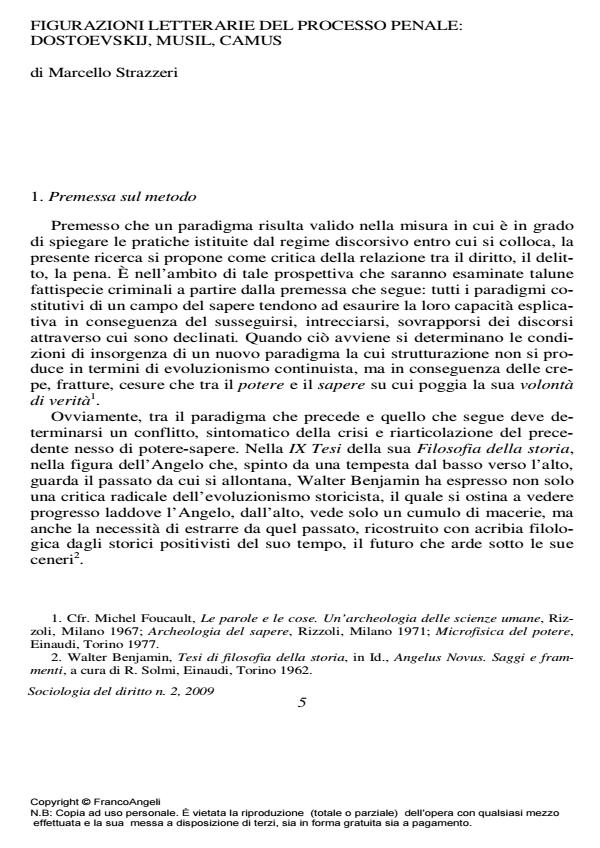Figurazioni letterarie del processo penale: Dostoevskij, Musil, Camus
Titolo Rivista SOCIOLOGIA DEL DIRITTO
Autori/Curatori Marcello Strazzeri
Anno di pubblicazione 2009 Fascicolo 2009/2
Lingua Italiano Numero pagine 21 P. 5-25 Dimensione file 334 KB
DOI 10.3280/SD2009-002001
Il DOI è il codice a barre della proprietà intellettuale: per saperne di più
clicca qui
Qui sotto puoi vedere in anteprima la prima pagina di questo articolo.
Se questo articolo ti interessa, lo puoi acquistare (e scaricare in formato pdf) seguendo le facili indicazioni per acquistare il download credit. Acquista Download Credits per scaricare questo Articolo in formato PDF

FrancoAngeli è membro della Publishers International Linking Association, Inc (PILA), associazione indipendente e non profit per facilitare (attraverso i servizi tecnologici implementati da CrossRef.org) l’accesso degli studiosi ai contenuti digitali nelle pubblicazioni professionali e scientifiche.
Literary figures in the Criminal Trial: Dostoevsky, Musil and Camus - This research sets out to verify the plausibility of certain writings in literature, in particular Dostoevsky’s Crime and Punishment, Musil’s The Man without Qualities and The Stranger by Camus, as critiques of how the law relates to crime and punishment. Using Elias’ figurational theory, cross-fertilised with the writings of Foucault, the author considers literature because it is capable of visualising and declaring the relationship’s complexity, the construction and practical declension of legal paradigms and the problematic juncture between law in force and living law. As a result, he illustrates how the story told by Dostoevsky in Crime and Punishment, in which he defends criminal responsibility as a primary subjective responsibility against all forms of bio-psychic and statistical-social determinism, can make a major contribution to today’s criminological debate. Similarly, the interrelated fortunes of the two main characters in Musil’s novel, Ulrich and Moosbrugger, the man without qualities and the criminal awaiting sentence, join with those of the chorus of characters from Viennese society that provide the backdrop to the tale to question the legal concept of mental infirmity. Lastly, The Stranger features the mechanism of the "pre-judicial" construction of guilt, in the course of legal proceedings that aim to demonstrate chronological continuity between the personality of the accused and the commission of the criminal act.
Marcello Strazzeri, Figurazioni letterarie del processo penale: Dostoevskij, Musil, Camus in "SOCIOLOGIA DEL DIRITTO " 2/2009, pp 5-25, DOI: 10.3280/SD2009-002001